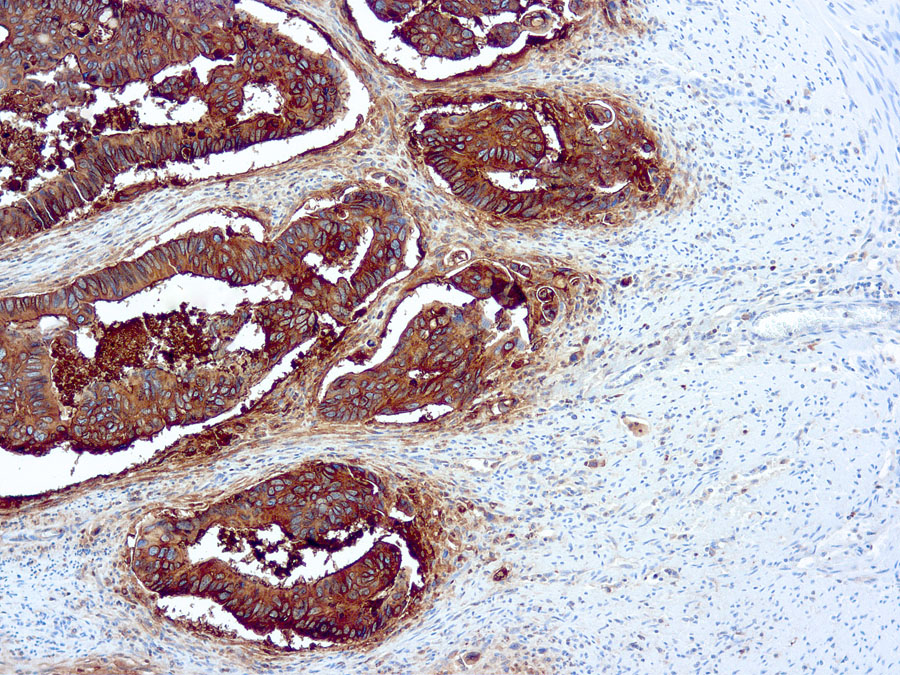Antibody (Suitable for clinical applications)
| Specification | Recommendation |
|---|---|
| Recommended Dilution (Conc) | 1:75-1:100 |
| Pretreatment | No Pretreatment Required |
| Incubation Parameters | 30 min at Room Temperature |
Prior to use, inspect vial for the presence of any precipitate or other unusual physical properties. These can indicate that the antibody has degraded and is no longer suitable for patient samples. Please run positive and negative controls simultaneously with all patient samples to account and control for errors in laboratory procedure. Use of methods or materials not recommended by enQuire Bio including change to dilution range and detection system should be routinely validated by the user.
Carcinoembryonic Information for Pathologists
Summary:
Also called CEA, carcinoembryonic antigen and CEACAM5. Either polyclonal (pCEA) or monoclonal (mCEA). Normally detected in glycocalyx of fetal epithelial cells. May play a role in the metastasis of cancer cells. Usually considered an epithelial marker with strong staining in adenocarcinomas.
Common Uses By Pathologists:
Adenocarcinoma (lung) vs. epithelioid mesothelioma: monoclonal CEA is 97% specific for lung adenocarcinoma (Histopathology 2006;48:223); exhibits diffuse cytoplasmic staining with membrane enhancement in adenocarcinoma, negative in mesothelioma. Adenocarcinoma (lung) vs. reactive mesothelial cells in fluid cytology: positive staining is 76% sensitive (Am J Clin Pathol 2001;116:709). Breast cancer vs. benign breast disease in FNA fluid: high levels are suggestive of malignancy (Arch Pathol Lab Med 2004;128:1251, free full text). Colorectal carcinoma: monitor serum levels (elevated in 72-97%) to detect recurrence (World J Gastroenterol 2006;12:3891), elevated preoperative serum levels are poor prognostic factor (Int J Cancer 2002;101:545); caution – elevated levels also present in cirrhosis, biliary obstruction, hepatitis, inflammatory bowel disease, smokers and post-surgical bowel sequestration with mucocele (Arch Pathol Lab Med 2003;127:1376). Cysts (various): CEA levels over 5 ng/dl in ascites fluid are associated with malignancy (J Clin Pathol 2001;54:831); but fluid in cysts may be CEA+ even when benign (Mod Pathol 1998;11:1171).
| Carcinoembryonic General Information | |
|---|---|
| Alternate Names | |
| Molecular Weight | |
| 76.8 kDa | |
| Chromosomal Location | |
| q13.2 [chr: 19] [chr_start: 41708585] [chr_end: 41729798] [strand: 1] | |
| Curated Database and Bioinformatic Data | |
| Gene Symbol | CEACAM5 |
| Entrez Gene ID | 1048 |
| RefSeq Protein Accession(s) | NP_001278413; NP_001295327; NP_004354 |
| RefSeq mRNA Accession(s) | XM_017026145; XM_017026146; XM_011526322; NM_001291484; NM_001308398; NM_004363 |
| RefSeq Genomic Accession(s) | NC_000019 |
| UniProt ID(s) | P06731 |
| PharmGKB ID(s) | PA26361 |
| KEGG Gene ID(s) | hsa:1048 |
| General Description of Carcinoembryonic . | |
| This antibody is a member of a family of complex antigens, which also includes non-specific cross-reacting antigens (NCA). This antibody stains specific regions of CEA. It reacts with colorectal adenocarcinomas but does not show any staining with polymorphonuclear neutrophils and erythrocytes. | |




There are no reviews yet.